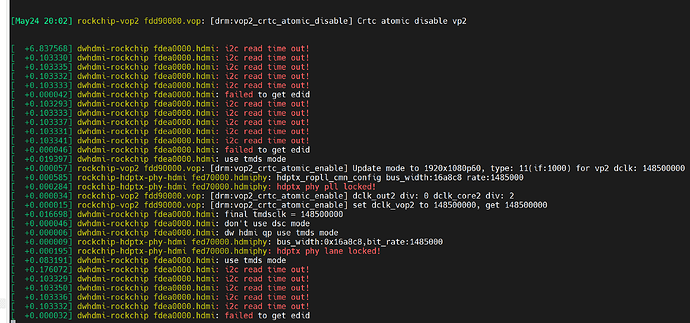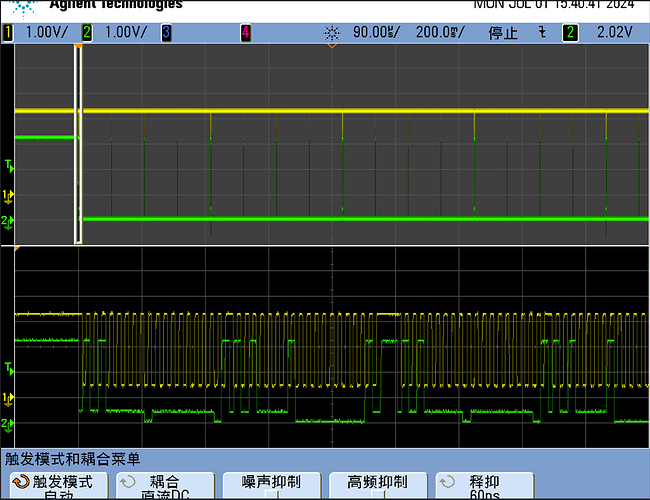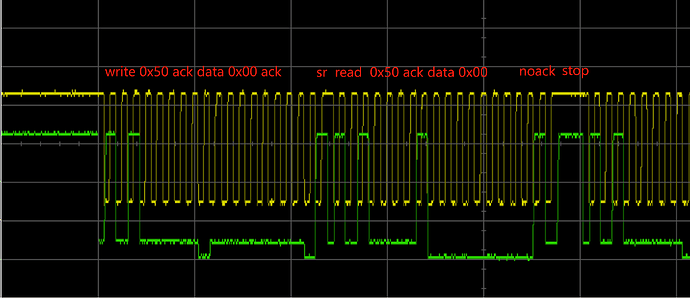HDMIout connected to an old monitor or HDMI to DVI connected to a DVI monitor cannot display. This type of problem is that the i2c under HDMI does not communicate successfully with the monitor and cannot read the device’s EDID
diff --git a/drivers/gpu/drm/bridge/synopsys/dw-hdmi-qp.c b/drivers/gpu/drm/bridge/synopsys/dw-hdmi-qp.c
index 906f0f628c2a..992c744dd99a 100644
--- a/drivers/gpu/drm/bridge/synopsys/dw-hdmi-qp.c
+++ b/drivers/gpu/drm/bridge/synopsys/dw-hdmi-qp.c
@@ -72,7 +72,7 @@ static const unsigned int dw_hdmi_cable[] = {
EXTCON_DISP_HDMI,
EXTCON_NONE,
};
-
+#define USE_CUS_EDID 1
/*
* Recommended N and Expected CTS Values in FRL Mode in chapter 9.2.2
* of HDMI Specification 2.1.
@@ -2263,7 +2269,18 @@ static int dw_hdmi_connector_get_modes(struct drm_connector *connector)
void *data = hdmi->plat_data->phy_data;
struct drm_property_blob *edid_blob_ptr = connector->edid_blob_ptr;
int i, ret = 0;
-
+#if USE_CUS_EDID
+ unsigned char cus_edid[] = {
+ 0x00,0xFF,0xFF,0xFF,0xFF,0xFF,0xFF,0x00,0x33,0x19,0x16,0x25,0x4C,0x39,0x34,0x33,
+ 0x23,0x15,0x01,0x03,0x81,0x40,0x28,0x78,0x3A,0x8D,0x85,0xAD,0x4F,0x35,0xB1,0x25,
+ 0x0E,0x50,0x54,0xA5,0x4B,0x00,0x71,0x4F,0x81,0x00,0x81,0x80,0xA9,0x40,0xD1,0x00,
+ 0xD1,0x40,0x01,0x01,0x01,0x01,0x09,0x33,0x80,0x41,0x70,0x38,0x11,0x40,0x18,0x10,
+ 0x22,0x00,0x81,0x91,0x21,0x00,0x00,0x1A,0x00,0x00,0x00,0xFF,0x00,0x50,0x48,0x35,
+ 0x4E,0x59,0x31,0x39,0x31,0x33,0x34,0x39,0x4C,0x0A,0x00,0x00,0x00,0xFC,0x2E,0x4C,
+ 0x58,0x59,0x31,0x39,0x32,0x30,0x58,0x31,0x30,0x38,0x30,0x0A,0x00,0x00,0x00,0xFD,
+ 0x00,0x31,0x56,0x1D,0x71,0x1C,0x00,0x0A,0x20,0x20,0x20,0x20,0x20,0x20,0x00,0x49
+ };
+#endif
if (hdmi->plat_data->right && hdmi->plat_data->right->next_bridge) {
struct drm_bridge *bridge = hdmi->plat_data->right->next_bridge;
@@ -2290,10 +2308,24 @@ static int dw_hdmi_connector_get_modes(struct drm_connector *connector)
return -ENOMEM;
memcpy(edid, edid_blob_ptr->data, edid_blob_ptr->length);
} else {;
edid = drm_get_edid(connector, hdmi->ddc);
hdmi->hdcp_caps = dw_hdmi_qp_hdcp_capable(hdmi);
}
-
+#if USE_CUS_EDID
+ if(edid){
+ dev_info(hdmi->dev, "==== get edid \n");
+ }
+ else{
+ dev_info(hdmi->dev, "==== failed edid to set cus_edid !\n");
+ kfree(edid);
+ edid = kmalloc(512, GFP_KERNEL);
+ if (!edid)
+ return -ENOMEM;
+ memset(edid, 0, 512);
+ memcpy(edid,cus_edid,128);
+ }
+#endif
if (edid) {
dev_dbg(hdmi->dev, "got edid: width[%d] x height[%d]\n",
edid->width_cm, edid->height_cm);
This is a patch that attempts to fix EDID and can solve the problem


